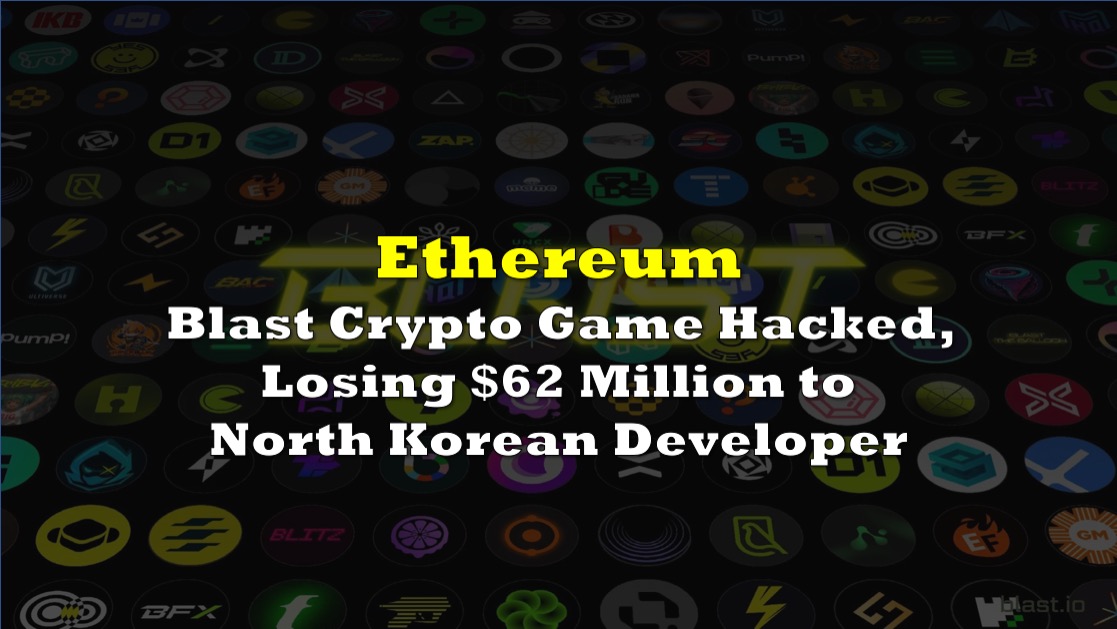A crypto game operating on Ethereum’s layer 2, known as Munchables and hosted on the Blast platform, has fallen victim to a hack, losing over $62 million in Ether (ETH). The breach, amounting to approximately 17,400 ETH, has sent shockwaves through the crypto community, drawing comparisons to Ethereum’s infamous DAO hack in 2016.
The exploit, which was revealed to have been facilitated by a developer hailing from North Korea, has raised concerns regarding the security and integrity of decentralized finance (DeFi) projects. According to Zachxbt, a prominent figure in the blockchain space, the attacker’s connections to North Korea have added a geopolitical dimension to the incident.
A crypto game built on Ethereum layer 2 Blast has been hacked for over $63 million ETH
— Crypto Tea (@CryptoTea_) March 26, 2024
they had hired a developer from North Korea according to Zachxbt
Ethereum's DAO hack in 2016 was worth $50 million, and eth had to roll back the chain and create a fork to reverse the…
#Munchables, a platform operating on #Blast, fell victim to an exploit totaling $62 million—yes, you read that right, $62 million. The issue stemmed from inadvertently hiring a developer from North Korea, who failed to transfer ownership of the smart contracts back to the team.
— Melon Husk 🍉 (@Melooooooooons) March 26, 2024
The Munchables team swiftly responded to the breach, issuing a statement confirming the compromise and pledging to track the movements of the stolen funds. However, the size of the loss has sparked discussions within the crypto community about the possibility of implementing a chain rollback, similar to the controversial measure taken by Ethereum in response to the DAO hack.
Munchables has been compromised. We are tracking movements and attempting to stop the the transactions. We will update as soon as we know more.
— Munchables (@_munchables_) March 26, 2024
Proponents of the rollback are arguing the need to protect investors and restore trust in the platform, while opponents warn of the precedent it might set and the erosion of decentralization principles. As Blast is primarily focused on gaming and experimentation rather than strict adherence to crypto ideology, the decision to conduct a rollback remains up in the air.
Further scrutiny into the identity of the perpetrator has revealed details about their past actions within the crypto space. PixelcraftStuds, a game development studio, disclosed previous encounters with the suspected hacker, describing their demeanor as suspicious and indicative of potential malicious intent.
We (@PixelcraftStuds) actually gave this guy try a trial hire back in 2022 to do some game dev work and he was sketchy af, definitely felt like he could be a NK hacker. We fired him within a month.
— coderdan.eth | aavegotchi 👻💊 (@coderdannn) March 27, 2024
He also tried to get us to hire one of his "friends" who was likely also a… https://t.co/jo0QRao7cL pic.twitter.com/aNCliSDffF
Zachxbt meanwhile has wore his thoughts on his sleeve about the hack.
When your privately funded sleuth shows their true colours.
— no.one (@d00msayerr) March 26, 2024
Embarassing. https://t.co/PDlZ9sPuWf
apparently this is an unpopular opinion
— Arnold Bernault (@ahitposter) March 27, 2024
if you are retarded enough to give your money to a protocol that launched an unverified contract made by north koreans just because you saw some tweets from your favorite grifters endorsing it, north korea deserves the money more than you pic.twitter.com/8HzV4Ud4Ns
Information for this briefing was found via the sources mentioned. The author has no securities or affiliations related to this organization. Not a recommendation to buy or sell. Always do additional research and consult a professional before purchasing a security. The author holds no licenses.











